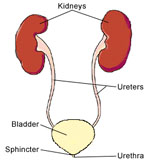Oral antibiotics potent enough to treat severe urinary tract infections

Washington, Oct 17 : A new study has suggested that using oral antibiotics could effectively treat severe urinary tract infections (UTI).
For the study, the researchers pooled data from 15 studies of 1,743 patients with severe, symptomatic UTI who received either oral or IV antibiotic treatment. Nine studies involved children, with six studies focusing on children less than one year old. Of the remaining six studies, two comprised women only, including one study of pregnant women.
After a year’s follow-up, 90 scans showed that 29 percent of the patients had kidney scarring, but the damage occurred equally among patients who had either switch or oral therapy. There was no significant difference in cure, re-infection or relapse rates; in the number of patients with fever after 48 hours; or in the number of patients with adverse effects.
The study therefore concluded that available oral antibiotics appear potent enough to treat patients with pyelonephritis efficiently, with no difference in long-term outcomes such as kidney scarring.
According to German reviewer Dr. Annette Pohl at University Clinic Freiburg, in light of this evidence, more doctors might consider using oral antibiotics to treat patients with severe UTI.
This could potentially lead to far fewer hospitalisations, which, besides avoiding disruption for patients and families, could also considerably reduce hospital and related medical costs.
However, Pohl has warned that treatment with oral antibiotics requires careful supervision to guarantee compliance and to make sure patients are tolerating oral drugs.
Hiep Nguyen, M.D., director of robotic surgery and research at the Urological Research Center, Children’s Hospital Boston, said that it might be hard to convince some doctors to prescribe oral therapy for a severe UTI, especially doctors who treat children, since the rate at which children can develop life-threatening complications is often faster than for adults.
“Children get sicker quicker and if bacteria reach the blood they can easily get sepsis. Children are more susceptible to kidney damage and have less resistance to infection. They can worsen in hours. Giving antibiotics intravenously is a practice heavily ingrained in most pediatricians and most physicians will continue to do what they have been taught to do,” Nguyen said.
“Modern-day oral antibiotics are just as effective and quickly absorbed, but some people may not believe they can get into the blood fast enough. More studies may need to be done,” he added.
The new study is published in the latest issue of The Cochrane Library. (ANI)